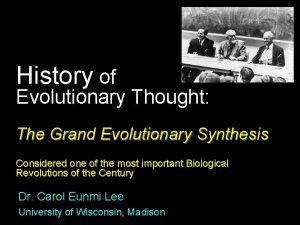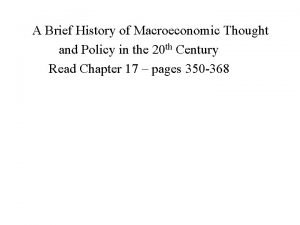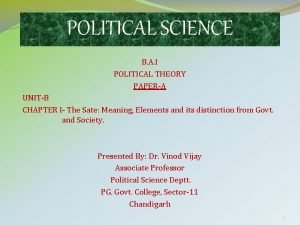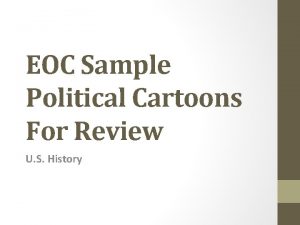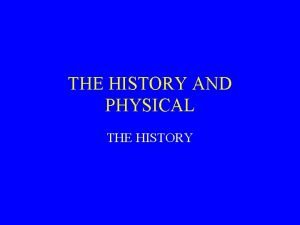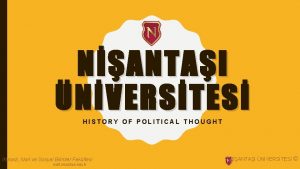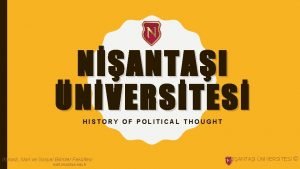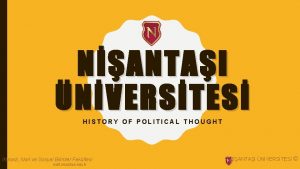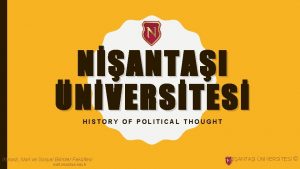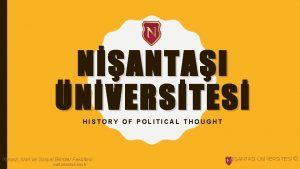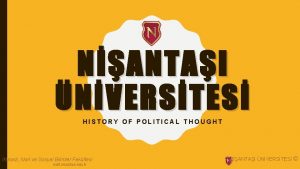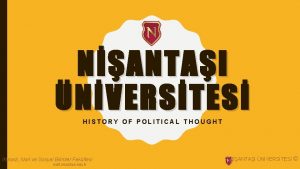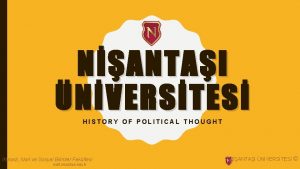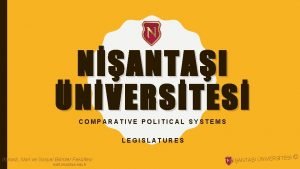NANTAI NVERSTES HISTORY OF POLITICAL THOUGHT ktisadi dari












- Slides: 12

NİŞANTAŞI ÜNİVERSİTESİ HISTORY OF POLITICAL THOUGHT İktisadi, İdari ve Sosyal Bilimler Fakültesi iisbf. nisantasi. edu. tr NİŞANTAŞI ÜNİVERSİTESİ ©

WEEK: 5 NİŞANTAŞI ÜNİVERSİTESİ ©

Cicero Marcus Cicero is one of the outstanding statesmen and orators of the Roman empire. He was born in Arpinum under Rome and got influenced by the works of Plato and Aristotle. He defended the Roman constitution against the autocracy of his time. Consequently, his works, which represented a form of Stoicism, were preserved for the reading public at all future times. NİŞANTAŞI ÜNİVERSİTESİ ©

One remarkable fact about the work of Cicero is that they were merely compilations of previous works and as such had little originality. However, the merit of his writings is based on the fact that they were widely read. It is also significant to note that the wide acceptability of Cicero’s works to the political authority in his time made it possible for accessibility to even future generations. Essentially, his political writings formed the main source of information on the form of Stoicism which Panaetius introduced to the Roman public. His outstanding political works include such political treatises like De Re Publica- The Republic 51 BC and De Legibus- The Law represents credible indexes of the political thoughts of Rome especially in conservative and aristocratic circles during the last days of the Republic. NİŞANTAŞI ÜNİVERSİTESİ ©

Cicero contends that the natural law of reason is the basis of all other laws and that its source is divine wisdom and reason that directs the entire universe. The state and its laws are always subject to the law of God, or the moral and natural law, that is, the higher rule of right which transcends human choice and human institutions. It is from this source that even the rules of nations which demands righteousness and deter from doing evil, and also other particular laws written and unwritten draw their power. The primal law for Cicero is the divine right reason of Supreme Jupiter (Roman god), powerful to establish right and wrong. Consequently, he argued that good and truth must be eternal since they NİŞANTAŞI ÜNİVERSİTESİ ©

Cicero emphasized the existence of a universal law of nature which has its origin in God’s providential government of the world as well as the rational and social nature of man which make them akin to God. In this law lies the constitution of the universal-state. The universal law in the views of Cicero is the same everywhere and is unchangeably binding on all men irrespective of nationality. He insists that any legislation that contravenes the universal law is not entitled to be described as law because no ruler or people can invalidate it. This is the true law which in his view is right reason. NİŞANTAŞI ÜNİVERSİTESİ ©

In his words: • There is in fact a true law- namely, right reason, which is in accordance with nature, applies to all men, and is unchangeable and eternal. By its commands this law summons men to the performance of their duties; by its prohibitions it restrains them from doing wrong. Its commands and prohibitions always influence good men, but are without effect upon the bad. NİŞANTAŞI ÜNİVERSİTESİ ©

To invalidate this law by human legislation is never morally right, nor is it permissible ever to restrict its operation, and to annul it wholly is impossible. Neither the senate nor the people can absolve us from our obligation to obey this law, and it requires no Sextus Aelius to expound and interpret it. It will not lay down one rule today and another tomorrow. But there will be one law, eternal and unchangeable, binding at all times upon all peoples; and there will be as it were, one common master and ruler of men, namely God, who is the author of this law, its interpreter and its sponsor. NİŞANTAŞI ÜNİVERSİTESİ ©

Law for Cicero is therefore, the natural force, that is, the mind and reason with which the intelligent man measures justice and injustice. This presupposes that justice has its roots in nature which is governed by reason of the immortal gods. Cicero also contends that man share of right reason, which is law, is common with the divine. It is his opinion that sharing law also implies sharing justice in common. Force to him, is therefore merely an accident in the nature of the state and it is justified only because it is required to give effect to the principles of justice and right. From this, he posits that all possessing these three qualities and obeying the same system of law, in common, gods and men, belong to a NİŞANTAŞI ÜNİVERSİTESİ ©

Cicero associated the origin of the state with man’s natural gift of social spirit which draws him always to partnership. A state in his view cannot exist permanently or in any form except a crippled condition, unless it depends upon or acknowledges the consciousness of mutual obligation and the mutual recognition of rights that bind its citizens together. It is therefore seen as a moral community, a group of persons who in common possess the state and its laws. NİŞANTAŞI ÜNİVERSİTESİ ©

Such a community represents an association of a good number of people based on justice and partnership to secure common good. It is based on this that he described political governance as res populi or the res publica, meaning “the affairs of the state” or “Commonwealth. ” He extended this logic further by insisting that unless a state retains it nature as a community for ethical purposes held together by common ties, it is nothing but what was later described by St. Augustine as “highway robbery on a large scale. ” It is on this basis that he observed that the Commonwealth is the people’s affair; and the people is not every group of men, associated in any manner, but is the coming together of a considerable number of men who are united by a common agreement about law and rights and by the desire to participate in mutual advantages. NİŞANTAŞI ÜNİVERSİTESİ ©

The state he therefore argued is a corporate body whose membership is in the possession of all citizens and supplies its members with the advantages of mutual aid and just government. As such, its authority arises from the collective power of the people and political power when rightly exercised, is nothing but the corporate power of the people. From this, he argued that the state cannot exist permanently except it depends upon, acknowledges or gives effects to the consciousness of mutual obligations and recognition of rights that bind its citizens together. NİŞANTAŞI ÜNİVERSİTESİ ©
 Nantai cash
Nantai cash Nantai 37
Nantai 37 Complete and incomplete thought examples
Complete and incomplete thought examples Political economic and social forces of management
Political economic and social forces of management Evolve
Evolve History of evolutionary thought
History of evolutionary thought History of macroeconomic thought
History of macroeconomic thought History of management thought
History of management thought Relationship between political science and ethics
Relationship between political science and ethics Economics and political science relationship
Economics and political science relationship Sample of political cartoon
Sample of political cartoon History also history physical
History also history physical You thought that i was like you
You thought that i was like you





